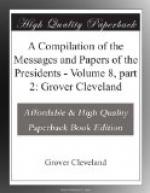The authority of Congress to terminate a treaty with a foreign power by expressing the will of the nation no longer to adhere to it is as free from controversy under our Constitution as is the further proposition that the power of making new treaties or modifying existing treaties is not lodged by the Constitution in Congress, but in the President, by and with the advice and consent of the Senate, as shown by the concurrence of two-thirds of that body. A denunciation of a treaty by any government is confessedly justifiable only upon some reason both of the highest justice and of the highest necessity. The action of Congress in the matter of the French treaties in 1798, if it be regarded as an abrogation by this nation of a subsisting treaty, strongly illustrates the character and degree of justification which was then thought suitable to such a proceeding. The preamble of the act recites that the—
Treaties concluded between the United States and France have been repeatedly violated on the part of the French Government, and the just claims of the United States for reparation of the injuries so committed have been refused, and their attempts to negotiate an amicable adjustment of all complaints between the two nations have been repelled with indignity.
And that—
Under authority of the French Government
there is yet pursued against
the United States a system of predatory
violence, infracting the said
treaties and hostile to the rights of
a free and independent nation.
The enactment, as a logical consequence of these recited facts, declares—
That the United States are of right freed and exonerated from the stipulations of the treaties and of the consular convention heretofore concluded between the United States and France, and that the same shall not henceforth be regarded as legally obligatory on the Government or citizens of the United States.
The history of the Government shows no other instance of an abrogation of a treaty by Congress.
Instances have sometimes occurred where the ordinary legislation of Congress has, by its conflict with some treaty obligation of the Government toward a foreign power, taken effect as an infraction of the treaty, and been judicially declared to be operative to that result; but neither such legislation nor such judicial sanction of the same has been regarded as an abrogation, even for the moment, of the treaty. On the contrary, the treaty in such case still subsists between the governments, and the casual infraction is repaired by appropriate satisfaction in maintenance of the treaty.




